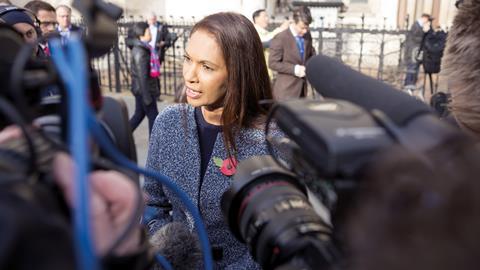Judges’ sentencing remarks have been broadcast in more than 30 cases during the year since this was first allowed, the Ministry of Justice (MoJ) announced last week, omitting to mention that the reform had been promised by ministers – and piloted by broadcasters – as long ago as 2016.

That’s not all. ‘Parliament,’ we were told, ‘is now consulting on whether to expand filming to include Court of Appeal judges sitting in the Crown court.’
Really? Appeal judges don’t sit in the Crown court, except on ceremonial occasions. Governments consult, not parliament.
The Gazette’s reporting team discovered that this was a reference to draft secondary legislation currently awaiting consideration by parliament’s joint committee on statutory instruments. If the Courts (Prescribed Recordings) Order 2023 is approved, it will allow prison and police officers to make recordings in court during security alerts, using body-worn cameras and CCTV.
Two minor provisions have been tagged on to this draft legislation. One will permit still photographs to be taken at the ceremony that sometimes follows an adoption order, presumably showing the child in court with the judge.
The other provision amends an order that specifies the type of judge whose sentencing remarks may be broadcast.
At present, it covers only High Court judges and some senior circuit judges. In future, it will extend to current and former appeal judges. Perhaps the MoJ is hoping that retired members of the Court of Appeal will volunteer to reduce the Crown court backlog.
The order currently before parliament will make no appreciable difference to broadcasting, despite the government’s gushing promises about ‘throwing the doors open on the workings of the country’s most senior judges’ and ‘shining a spotlight on the inner workings of the Crown court’. But the MoJ is currently consulting on plans to support and strengthen open justice. There is certainly scope for increasing openness by extending broadcasting.
In the Crown court, all we can see is a mid-shot of the judge delivering sentencing remarks. Why not extend this to include speeches in mitigation by defence counsel and any response from the prosecution – as happens when criminal appeals are televised?
Victim impact statements are sometimes read out by victims themselves, their families or lawyers. These must be handled with sensitivity, but the judge should surely have a discretion to let them be broadcast.
Should we be allowed to watch an offender being sentenced? News organisations routinely publish images of convicted defendants, sometimes provided by the police. Although this breaches the offender’s privacy, it may be justified under Article 8 of the Human Rights Convention in the interests of national security, public safety or the prevention of crime.
In recent months, a number of high-profile offenders have refused to come up from the cells for sentencing. The government has promised legislation that would compel them to do so – though I have yet to see how this could be made to work. Might the prospect of being seen on television discourage defendants from attending court? In many cases, I suspect it would have the opposite effect.
But the judges are cautious. Mrs Justice Cheema-Grubb, whose sentencing remarks have been televised in a number of high-profile cases, said she was ‘pleased that the way broadcasting is done protects the identity of witnesses, victims, family members and jurors’.
Judge Lucraft KC, the senior Old Bailey judge, said he often asked a judicial colleague to look through what he was planning to say on camera – just to make sure there was nothing that would sound unfortunate in the context of the case. Both judges were speaking in interviews published this week by the judiciary.
For some years, broadcasters have been arguing that they should be allowed to televise criminal trials in full. Hearings would be broadcast ‘as live’ – meaning that there would be enough of a delay for the judge to block transmission if a problem arose. I am not persuaded that this should include oral evidence from witnesses.
Giving evidence is stressful enough for most people and the prospect of cross-examination on television is bound to deter some witnesses from coming forward, even if they are promised anonymity. Those who do give evidence may come under pressure after family, friends and even strangers have watched them do so. Witnesses called later in a trial might change their evidence in the light of what they have seen.
On the civil side, though, I would strongly support the broadcasting of judicial review claims in the High Court. If people had watched Gina Miller’s first Brexit-related challenge, they would have seen that the judges who granted it were not, as a newspaper subsequently claimed, ‘enemies of the people’. With civil appeal hearings now routinely streamed to YouTube, the judges have nothing to fear from letting the public see how public law works.
joshua@rozenberg.net
































1 Reader's comment